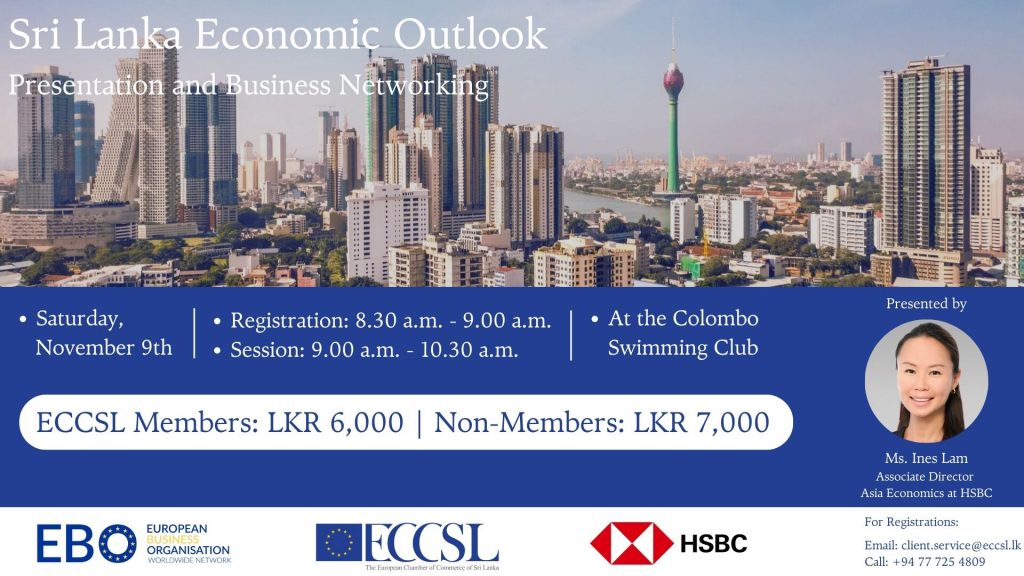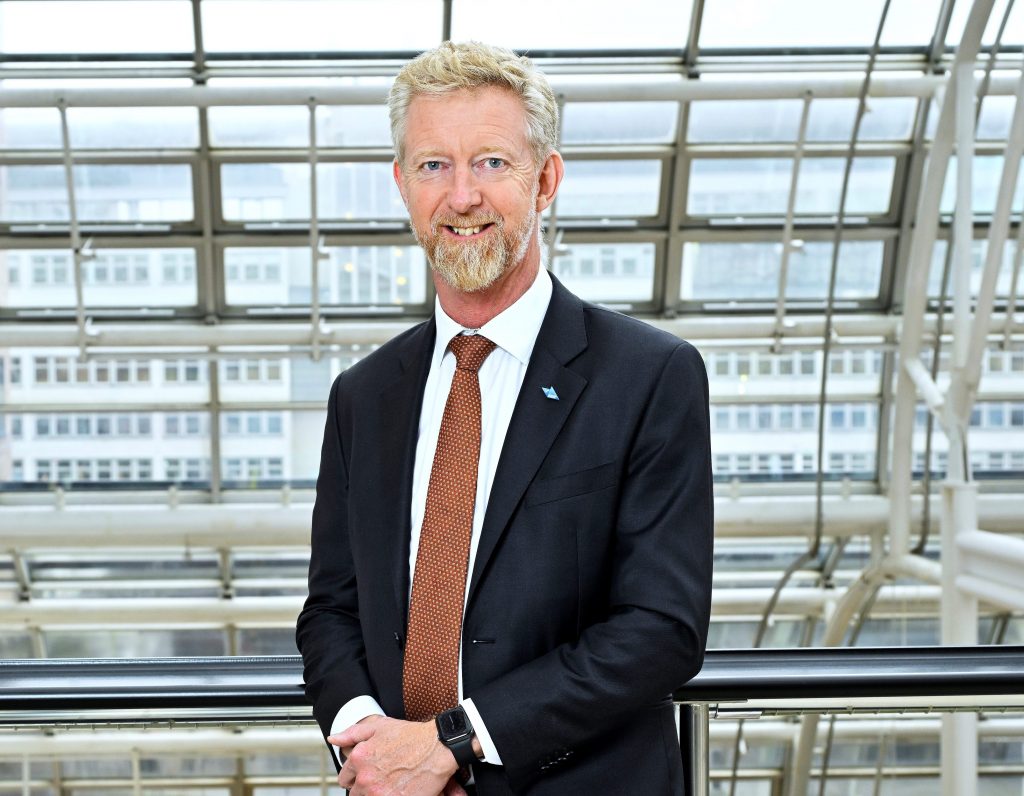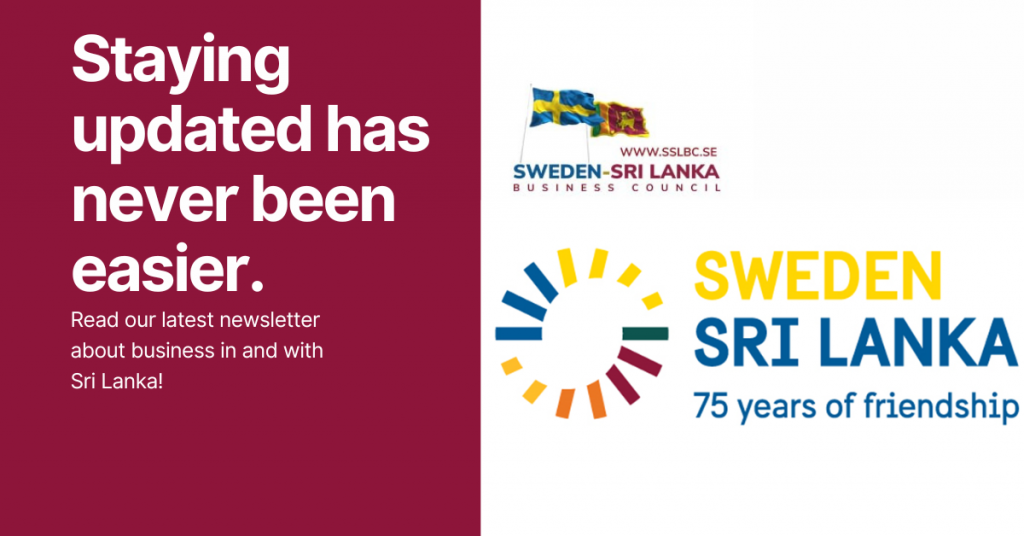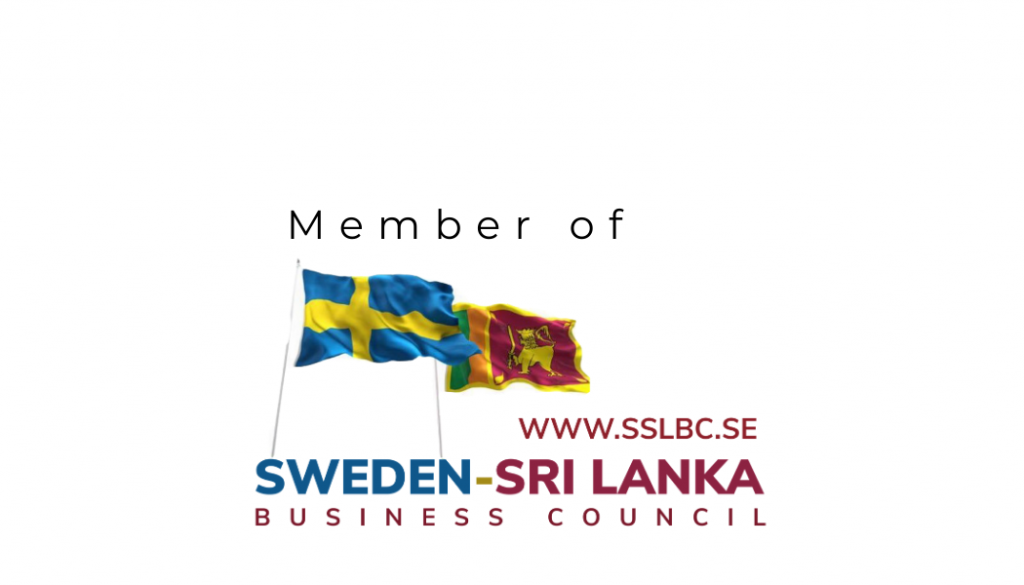
ECSSL seminarium


Blog and info about business Sweden-Sri Lanka

Hej
För kännedom skickar jag över denna länk: Global Gateway – Affärsmöjligheter – Europeiska kommissionen
Ni har säkert hört talas om Global Gateway men inte riktigt förstått hur man kan skapa sig affärsmöjligheter inom programmet. Det är det få som har gjort för informationen har varit minst sagt bristfällig. Samtidigt tyder det mesta på att programmet på ett eller annat sätt kommer expandera framöver, kanske kraftigt, vilket beror på geopolitiska spänningar som gör att EU vill att europeiska företag får ett starkare fotfäste i många utvecklingsländer.
Förhoppningsvis kan informationen i länken skapa lite klarhet.
3 quick questions for Jan Larsson, CEO of Business Sweden on Asian growth and Sri Lanka as a business nation. Business Sweden helps Swedish companies to increase their global sales and international companies to invest and expand in Sweden. Jan Larsson has previously been Senior Vice President of Communications for the commercial banks Handelsbanken and Nordea, State Secretary in the Prime Minister’s Office, and consultant at McKinsey & Co.

Much of the global trade growth is taking place in Asia. How is Business Sweden working to ensure that Swedish businesses are part of this growth?
It is well known that the largest population growth, urbanization and strongest economic growth in the world is taking place in the Indo-Pacific region. Sri Lanka is at its geographical center. Business Sweden works with this region in several ways based on the needs of Swedish companies. Among other things, by reaching out to small and medium-sized Swedish companies to show market potential and sourcing opportunities. The concept of “China +1” is becoming increasingly established, i.e. establishing production in more Asian countries than China to build increased resilience.
What is your view of Sri Lanka as a business nation?
It is an exciting country that has many fundamentals in place. Important elements are a strategic location, a well-organized state, and a well-educated workforce. The macro economy has stabilized, the country has signed several free trade agreements, and has a modern attitude towards sustainability. Now it is important that the country continues to work on its positioning; being an open economy, continue to have high ambitions, move with the times, engage in sustainable production, and further develop a progressive attitude towards education and healthcare.
Awareness is key in trade relations. How can Sri Lanka raise awareness in Sweden about its business community?
The eyes of the world are on Southeast Asia. It is important to stand out. Sri Lanka needs to refine its strategic competitive advantage and act on it. To increase awareness of Sri Lankan business, it is important to use the experience of Swedish companies, those who trade with Sri Lanka and those who have operations in the country. Team Sweden is also a resource. It is a network of authorities and companies that work together to promote Swedish exports and investments in Sweden. The network exists for both Swedish and Sri Lankan companies.
From our sister organisation in Colombo.
Newsletter from our partner ECCSL in Colombo
Samudika Weliweryage is a PhD-student in tourism studies at Mid Sweden University since 2022. Her research field is consumer behaviour and pro-environmental behaviours in tourism. She has a bachelor’s degree in business management, from the University of Kelaniya, Sri Lanka and a master’s degree in Tourism and Destination Development from Dalarna University.

What are the key factors to develop sustainable travel practices further?
There are many ways. However, the most effective way to promote sustainable travel is by making it easier, more enjoyable, and cost-effective. In tourism, where pleasure is a priority, encouraging sustainable practices can be challenging without these factors. For example, Åre a popular mountain biking destination in Sweden, is accessible via sustainable transportation like trains. However, most visitors still rely on fossil fuel-based cars. Research shows that this is because sustainable travel options are often seen as inconvenient, expensive, and less enjoyable compared to their counterparts. Addressing these issues requires multi-stakeholder collaboration between the public and private sectors to make sustainable travel more appealing.
What key trends do we observe in the post-pandemic travel and tourism sector?
Among many trends a few that stand out include revenge travel, the rise of workations and digital nomadism, heightened interest in wellness tourism, transformative tourism and nature-based tourism in peripheral regions. One of the most immediate changes in tourist behaviours was revenge travel, which resulted in a sharp increase in tourists’ long-distance travel due to the pandemic fatigue. Another emerging travel trend is workations and digital nomadism. Remote working became normalized during the pandemic, vastly changing people’s perception of how and where we work and our work-life balance. As a result, many individuals are now realizing their dreams of visiting tourist destinations without compromising their professional lives.
As mentioned previously, the pandemic was a wake-up call for many individuals regarding their physical and mental well-being. This further accelerated the popularity of wellness and transformative tourism activities such as yoga and spa retreats, adventure tourism activities focused on improving physical activity, and nature-based tourism.
How can the Sri Lankan tourist industry attract Swedish tourists further?
First, work with market insights. Understand the market, especially the different tourist segments within the Swedish market, their demographics, their travel needs, preferences and travel planning behaviors. This calls for collaboration with different players such as Swedish tourism authorities, industry associations, travel and tour operators and so forth. Based on these insights, the Sri Lankan tourism offer and its value propositions must be further explored and aligned with the needs of the identified market segments. The next, crucial step is to maintain and execute a consistent and integrated destination marketing campaign to effectively reach the Swedish market.
Our latest newsletter – https://gansub.com/t/v/0_NDA2NTM4NzIwNTQ3Mg==/

29th August H.E Ambassador Fonseka hosted members of SSLBC for afternoon tea at the embassy in Stockholm.
SSLBC extend our heartfelt thanks for inviting our members to the delightful afternoon tea yesterday. The event was highly appreciated by all attendees and serves as a solid foundation for continued collaboration.
The Business Council eagerly anticipates future joint engagements in Stockholm and other parts of Sweden, fostering our mutual objectives and strengthening our partnership.
Additionally, we would like to express our sincere gratitude to the embassy staff for their impeccable organisation and warm hospitality. Their efforts significantly contributed to the success of the event.

We offer different categories of membership. This time we would like to introduce one Swedish private member and one associated member from Sri Lanka.
Mats Thorner from Sweden is a new member of SSLBC. Mats is working together with our new associated member Sachin Lakshitha.
Mats is a senior freelance journalist, marketing specialist, and photographer.
Sachin is a skilled specialist in photo and video editing, among other areas.
They have collaborated on various projects over the past 5-6 years. They tell us that they are currently planning to launch a 3D printing service in Sri Lanka.
We hope that their membership will be of mutual benefit to them and all other members of SSLBC.
Welcome to the fast-growing network of companies and individuals doing business between Sweden and Sri Lanka!
